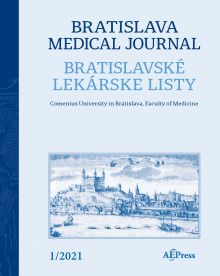Journal info
|
||||
Select Journal
Journals
Bratislava Medical Journal 2024 2023 2022 2021 2020 2019 2018 2017 2016 2015 2014 2013 2012 Ekologia - Ecology Endocrine Regulations General Physiology and Biophysics Neoplasma Acta Virologica Studia Psychologica Cardiology Letters Psychológia a patopsych. dieťaťa Kovove Materialy-Metallic Materials Slovenská hudba 2025Webshop Cart
Your Cart is currently empty.
Info: Your browser does not accept cookies. To put products into your cart and purchase them you need to enable cookies.
Bratislava Medical Journal Vol.114, No.6, p.330-332, 2013 |
||
| Title: Prevalence of mutations in thiopurine S-methyltransferase gene among Slovak IBD patients | ||
| Author: B. Desatova, T. Hlavaty, D. Balakova, I. Pav, P. Celec, M. Gregus, M. Zakuciova, M. Hlista, M. Horakova, L. Kadasi, M. Huorka, M. Batovsky | ||
| Abstract: Thiopurine S-methyltransferase (TPMT) plays an important role in the metabolism of thiopurines. It has been suggested that TPMT genetic polymorphisms lead to dose-related hematopoietic toxicity. Since there are major ethnic differences in the prevalence of particular TPMT variants, it is important for each country to study their own prevalence in order to estimate the role of TPMT variants-related thiopurines toxicity in population suffering from particular inflammatory bowel disease (IBD). Aims: The aim of this study was to determine the frequency of the four most common allelic variants of TPMT gene in the population of Slovak IBD patients. Methods: TPMT genetic polymorphisms (TPMT*2, TPMT*3A, TPMT*3B, TPMT*3C) were amplified using PCR and consequently genotyped with genetic analyzer. The allele frequencies of particular allelic variants were calculated and compared with other Caucasian populations reported so far. Results: Three hundred and thirty IBD patients were included; 196/132/2 cases of Crohn´s disease/ulcerative colitis/unclassified colitis; 180 (55 %) males. Ninety-three percent of patients were homozygous for wild-type TPMT variant. Heterozygous genotype of any of the studied polymorphisms was present in 6 % of patients while only one patient was homozygous for TPMT*3A allele (0.3 %). The most prevalent mutant allele was that of TPMT*3A (3.2 %). The distribution of most common allelic variants of TPMT gene among Slovak IBD patients was in accordance with previously reported prevalence in Caucasian populations. Conclusion: This study shows the prevalence of TPMT genetic polymorphisms in population of Slovak IBD patients. As in other Caucasian populations, the most common mutant allelic variant is that of TPMT*3A while the prevalence of homozygosity is relatively low (Tab. 3, Ref. 22). |
||
| Keywords: thiopurine S-methyltransferase, thiopurines toxicity, genetic polymorphisms. | ||
| Year: 2013, Volume: 114, Issue: 6 | Page From: 330, Page To: 332 | |
| doi:10.4149/BLL_2013_069 |
||
|
|
 download file download file |
|

